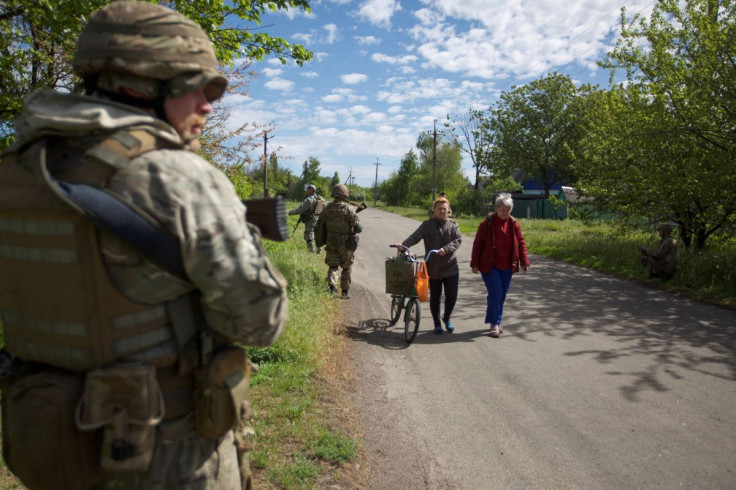Street Fighting Rages As Kyiv Seeks To Hold Sievierodonetsk Gains

Ukrainian troops battled Russians street-to-street in the ruins of Sievierodonetsk on Tuesday, trying to hold onto gains from a surprise counter-offensive that had reversed momentum in one of the bloodiest land battles of the war.
The fight for the small industrial city has emerged as a pivotal battle in eastern Ukraine, with Russia focusing its offensive might there in the hope of achieving one of its stated war aims - to fully capture surrounding Luhansk province on behalf of separatist proxies.
After withdrawing from nearly all the city in the face of the Russian advance, Ukrainian forces staged a surprise counter-attack last week, driving the Russians from a swath of the city centre. Since then, the two armies have faced off across boulevards, both claiming to have inflicted huge casualties.
"Our heroes are not giving up positions in Sievierodonetsk," President Volodymyr Zelenskiy said in an overnight video address, describing fierce street fighting in the city. Earlier, he told reporters at a briefing the Ukrainians were outnumbered but still had "every chance" of fighting back.
Before Ukraine's counter-offensive, Russia had seemed on the verge of encircling Ukraine's garrison in Luhansk province, cutting off the main road to Sievierodonetsk and its twin city Lysychansk across the Siverskiy Donets river.
But following the counter-offensive, Zelenskiy made a surprise visit to Lysychansk on Sunday, personally demonstrating that Kyiv still had an open route to its troops' redoubt.
Ukraine's defence ministry said Russia was throwing troops and equipment into its drive to capture Sievierodonetsk. Luhansk Governor Serhiy Gaidai said on Monday the situation had worsened since the Ukrainian defenders had pushed back the Russians over the weekend.
REFOCUS
Luhansk and neighbouring Donetsk province, together known as the Donbas, have become Russia's main focus since its forces were defeated at the outskirts of Kyiv in March and pushed back from the second biggest city Kharkiv last month.
Russia has been pressing from three main directions - east, north and south - to try to encircle the Ukrainians in the Donbas. Russia has made progress, but only slowly, failing to deal a decisive blow or to encircle the Ukrainians.
In its nightly update, the Ukrainian military said two civilians were killed in Russian shelling in the Donbas and Russian forces had fired at more than 20 communities, using artillery and air strikes.
In Druzhkivka, in the Ukrainian-held pocket of Donetsk province, residents were picking through the wreckage of houses obliterated by the latest shelling.
"Please help, we need materials for the roof, for the house, there are people without shelter," shouted Nelya, outside her home where the roof had been shredded. "My niece, she has two small children, she had to cover one of her children with her own body."
Nearby, Nadezhda picked up a children's pink photo album and kindergarten exercise book from the ruins of her house, and put them on a shelf somehow still standing in the rubble.
"I do not even know where to start. I am standing here looking but I have no idea what to do. I start crying, I calm down, then I cry again."
Russia invaded Ukraine on Feb. 24, in what it calls a "special military operation" to stamp out what it sees as threats to its security. Ukraine and its Western allies call this a baseless pretext for a war to grab territory.
CONSTANT SHELLING
Britain's defence ministry said on Tuesday that Russia was still trying to cut off Sievierodonetsk by advancing from the north near Izium and from the south near Popasna. It said Russia's progress from Popasna had stalled over the last week, while reports of heavy shelling near Izium suggested Moscow was preparing a new offensive there.
"Russia will almost certainly need to achieve a breakthrough on at least one of these axes to translate tactical gains to operational level success and progress towards its political objective of controlling all of Donetsk Oblast," it said.
The Donetsk regional governor, Pavlo Kyrylenko, told Ukrainian television there was constant shelling along the front line, with Russia attempting to push towards Sloviansk and Kramatorsk, the two biggest Ukrainian-held cities in Donetsk.
Kyrylenko said efforts were underway to evacuate people from several towns, some under attack day and night, including Sloviansk where about 24,000 residents, around a quarter of the population, still remains.
"People are now understanding, though it is late, that it is time to leave," he said.
Ukraine is one of the world's biggest exporters of grain, and Western countries accuse Russia of creating risk of global famine by shutting Ukraine's Black Sea ports.
Zelenskiy said Kyiv was gradually receiving "specific anti-ship systems", and that these would be the best way to break a Russian blockade of Ukrainian ports.
Moscow denies blame for the food crisis, which it says was caused by Western sanctions.
Russia's U.N. envoy, Vassily Nebenzia, stormed out of a U.N. Security Council meeting on Monday as European Council President Charles Michel, addressing the 15-member body, accused Moscow of fueling the global food crisis with its invasion of Ukraine.
Russian Foreign Minister Sergei Lavrov said Moscow would respond to Western deliveries of long-range weapons by pushing Ukrainian forces further back from Russia's border.
© Copyright Thomson Reuters 2024. All rights reserved.







